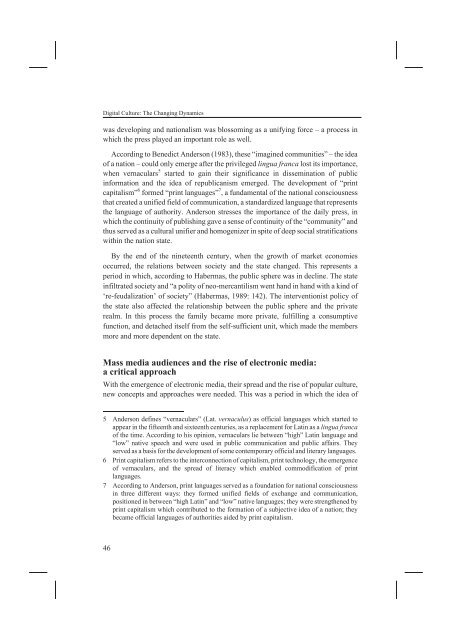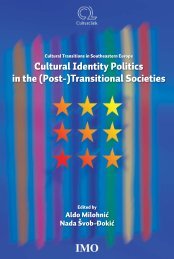D:\Documents and Settings\Ana\My Documents\Biserka-knjiga ...
D:\Documents and Settings\Ana\My Documents\Biserka-knjiga ...
D:\Documents and Settings\Ana\My Documents\Biserka-knjiga ...
You also want an ePaper? Increase the reach of your titles
YUMPU automatically turns print PDFs into web optimized ePapers that Google loves.
Digital Culture: The Changing Dynamics<br />
was developing <strong>and</strong> nationalism was blossoming as a unifying force – a process in<br />
which the press played an important role as well.<br />
According to Benedict Anderson (1983), these “imagined communities” – the idea<br />
of a nation – could only emerge after the privileged lingua franca lost its importance,<br />
when vernaculars 5 started to gain their significance in dissemination of public<br />
information <strong>and</strong> the idea of republicanism emerged. The development of “print<br />
capitalism” 6 formed “print languages” 7 , a fundamental of the national consciousness<br />
that created a unified field of communication, a st<strong>and</strong>ardized language that represents<br />
the language of authority. Anderson stresses the importance of the daily press, in<br />
which the continuity of publishing gave a sense of continuity of the “community” <strong>and</strong><br />
thus served as a cultural unifier <strong>and</strong> homogenizer in spite of deep social stratifications<br />
within the nation state.<br />
By the end of the nineteenth century, when the growth of market economies<br />
occurred, the relations between society <strong>and</strong> the state changed. This represents a<br />
period in which, according to Habermas, the public sphere was in decline. The state<br />
infiltrated society <strong>and</strong> “a polity of neo-mercantilism went h<strong>and</strong> in h<strong>and</strong> with a kind of<br />
‘re-feudalization’ of society” (Habermas, 1989: 142). The interventionist policy of<br />
the state also affected the relationship between the public sphere <strong>and</strong> the private<br />
realm. In this process the family became more private, fulfilling a consumptive<br />
function, <strong>and</strong> detached itself from the self-sufficient unit, which made the members<br />
more <strong>and</strong> more dependent on the state.<br />
Mass media audiences <strong>and</strong> the rise of electronic media:<br />
a critical approach<br />
With the emergence of electronic media, their spread <strong>and</strong> the rise of popular culture,<br />
new concepts <strong>and</strong> approaches were needed. This was a period in which the idea of<br />
5 Anderson defines “vernaculars” (Lat. vernaculus) as official languages which started to<br />
appear in the fifteenth <strong>and</strong> sixteenth centuries, as a replacement for Latin as a lingua franca<br />
of the time. According to his opinion, vernaculars lie between “high” Latin language <strong>and</strong><br />
“low” native speech <strong>and</strong> were used in public communication <strong>and</strong> public affairs. They<br />
served as a basis for the development of some contemporary official <strong>and</strong> literary languages.<br />
6 Print capitalism refers to the interconnection of capitalism, print technology, the emergence<br />
of vernaculars, <strong>and</strong> the spread of literacy which enabled commodification of print<br />
languages.<br />
7 According to Anderson, print languages served as a foundation for national consciousness<br />
in three different ways: they formed unified fields of exchange <strong>and</strong> communication,<br />
positioned in between “high Latin” <strong>and</strong> “low” native languages; they were strengthened by<br />
print capitalism which contributed to the formation of a subjective idea of a nation; they<br />
became official languages of authorities aided by print capitalism.<br />
46



